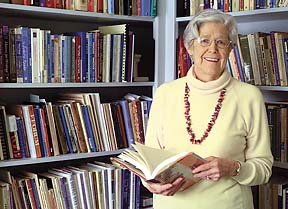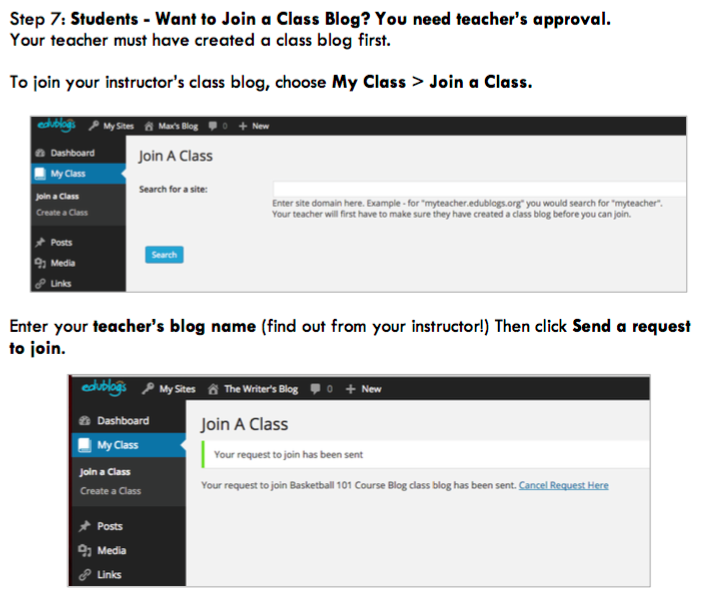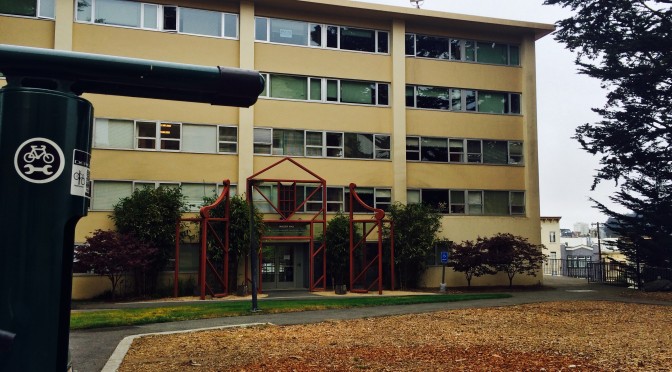The New York Times has just published an opinion article about public speaking and rhetoric. The article focuses on Donald Trump, but illuminates larger questions of authenticity and honesty in political speech. “Across the West,” the writer tells us, “the conventional language of politics really is undergoing a crisis of credibility.”
Join Speaking of Bicycles
Great! You’ve created your blog and made your first post.
You can experiment this weekend with adding tags and other information.
The next step is to join the course blog. You can do this in the “My Class” tab — it can be found in the upper left corner of your screen and looks kind of like a book icon.
From the “My Class” tab, choose “Join a Class.” Then you need to enter the name of our class blog. I think it’s the URL:
https://usfblogs.usfca.edu/speakingofbicycles/
or maybe just speakingofbicycles
See illustration below!
Horner, Establishing Credibility

Winifred Bryan Horner of Columbia, a former English Professor at MU.
Winifred Horner’s short chapter on credibility is based on ancient theories of rhetoric.
According to Aristotle, a speaker’s credibility depends on three characteristics:
- intelligence and common sense
- virtue and good character
- goodwill
Horner discusses these three forms of credibility (or ethos) using the example of Martin Luther King, Jr.
For Tuesday, August 29, read Horner’s short chapter (it originally appeared in a textbook for undergraduate students). The PDF is available here.
Carlsson, Critical Mass
Chris Carlsson, a San Francisco activist and writer, was there at the beginning of Critical Mass (or the “Commute Clot,” as it was originally known).
Since the first Critical Mass more than twenty years ago, the event has spread around the world. Here in San Francisco, as elsewhere, it has sometimes caused controversy.
In short, the event has variable credibility: some people strongly approve of it, while others are sharply critical of it (or of some elements of it).
Your assignment is to read some selections in a book edited by Carlsson (many other people contributed to the book, as you’ll see). Read Carlsson’s Introduction and a few of the selections that follow. This will give you a sense of the participants’ view of the event. The PDF is linked here.
The entire book is available at the USF library in print form and at nearby bookstores such as Green Apple Books.
If you’re thinking of going to Critical Mass, you might also want to watch the rest of USF student Ellie Vanderlip’s film The Human Motor.
The ride begins at Justin Herman Plaza on the last Friday of every month. People begin assembling around 5 or 5:30 pm, and they actually begin riding around 6 pm usually. There is no leader and no one is in charge.
How to Create a USF Blog
Task: Create your own USF Blog
Effective communicators need to use a wide range of online tools to make an impact. For this reason, Speaking of Bicycles is managed through a WordPress site hosted by USF.
In order to turn in your work and interact online with other students and with community partners, you’ll need to create your own blog and link it to the course site.
Working with WordPress (the software behind the course site and millions of other sites around the world) will help you develop valuable communication skills and a better understanding of what’s “under the hood” of a lot of the internet.
WordPress also allows us to have an “open connected” course, where community partners and students can interact and share information and ideas.
The Center for Instructional Technology has prepared instructions for creating your own USF blog.
Download this PDF to learn about the basic features of WordPress and USFBlogs.
Clip of the Day: The Human Motor
USF’s Speaking Center
PUBLIC SPEAKING COACHING
The Speaking Center at the University of San Francisco is available to help all USF students prepare for public speaking–including speeches, oral presentations, team presentations, and powerpoint demonstrations.
Coaches can help you with a variety of aspects of public speaking, including:
- effective oral communication skills
- achieving engaging delivery
- using transitions effectively
- developing concise and clear main points
- crafting introductions and conclusions.
Coaches are trained, skilled, and experienced public speakers.
Drop in or schedule an appointment through Tutortrac.
Drop-In Hours:
Monday – Friday 11:00 am – 1:00 pm and 4:00 – 5:00 pm
Malloy Hall 103 (near that bike repair stand!)
To Make Appointments:
Use tutortrac https://tutortrac.usfca.edu
Email: Speakingcenter@usfca.edu, or stop by the center.
Center Supervisor: Jacquelyn Horton jrhorton@usfca.edu
Director of Public Speaking: Michelle Lavigne mrlavigne@usfca.edu
Malcolm Gladwell on Public Speaking
Journalist Malcolm Gladwell has written a number of best-selling books, including Blink, The Tipping Point, Outliers, What the Dog Saw, and most recently, David and Goliath: Underdogs, Misfits, and the Art of Battling Giants. You can read a lot of his articles online at The New Yorker, such as this piece about college rankings: “The Order of Things: What College Rankings Really Tell Us.”
Gladwell has also become a celebrated public speaker. You can want a bunch of his TED talks, he’s appeared at universities, and lectured at Google.
In a 2010 interview, Sarfraz Manzoor asked Gladwell about his public speaking career. Gladwell replied that “Speaking is not an act of extroversion. People think it is, but it has nothing to do with extroversion. It’s a performance, and many performers are hugely introverted.”
The part about extroversion begins at 2:10.
Info for Partners
Becoming a Public Speaker
The first chapter of A Pocket Guide to Public Speaking offers some great observations about the work we’ll do in this course.
First, the authors emphasize that public speaking is a valuable skill that applies to your other courses and to your whole life.
Second, they point out that communication is essential for citizenship: in a democracy, effective communicators have the opportunity to shape law and policy.
Finally, they give some tips for how to draw on your prior knowledge and experience to succeed in this course.
You can find the text here: https://usfblogs.usfca.edu/speakingofbicycles/becoming-a-public-speaker/pocket-guide-to-public-speaking-chapter-1/



